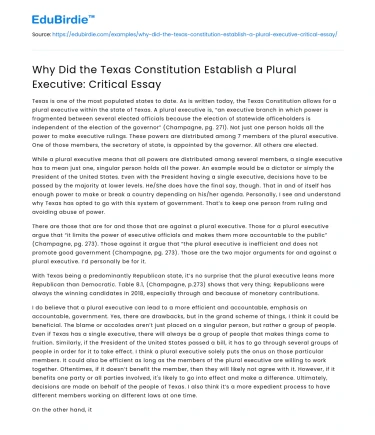Texas is one of the most populated states to date. As is written today, the Texas Constitution allows for a plural executive within the state of Texas. A plural executive is, “an executive branch in which power is fragmented between several elected officials because the election of statewide officeholders is independent of the election of the governor” (Champagne, pg. 271). Not just one person holds all the power to make executive rulings. These powers are distributed among 7 members of the plural executive. One of those members, the secretary of state, is appointed by the governor. All others are elected.
While a plural executive means that all powers are distributed among several members, a single executive has to mean just one, singular person holds all the power. An example would be a dictator or simply the President of the United States. Even with the President having a single executive, decisions have to be passed by the majority at lower levels. He/She does have the final say, though. That in and of itself has enough power to make or break a country depending on his/her agenda. Personally, I see and understand why Texas has opted to go with this system of government. That’s to keep one person from ruling and avoiding abuse of power.
Save your time!
We can take care of your essay
- Proper editing and formatting
- Free revision, title page, and bibliography
- Flexible prices and money-back guarantee
There are those that are for and those that are against a plural executive. Those for a plural executive argue that “it limits the power of executive officials and makes them more accountable to the public” (Champagne, pg. 273). Those against it argue that “the plural executive is inefficient and does not promote good government (Champagne, pg. 273). Those are the two major arguments for and against a plural executive. I’d personally be for it.
With Texas being a predominantly Republican state, it’s no surprise that the plural executive leans more Republican than Democratic. Table 8.1, (Champagne, p.273) shows that very thing; Republicans were always the winning candidates in 2018, especially through and because of monetary contributions.
I do believe that a plural executive can lead to a more efficient and accountable, emphasis on accountable, government. Yes, there are drawbacks, but in the grand scheme of things, I think it could be beneficial. The blame or accolades aren’t just placed on a singular person, but rather a group of people. Even if Texas has a single executive, there will always be a group of people that makes things come to fruition. Similarly, if the President of the United States passed a bill, it has to go through several groups of people in order for it to take effect. I think a plural executive solely puts the onus on those particular members. It could also be efficient as long as the members of the plural executive are willing to work together. Oftentimes, if it doesn’t benefit the member, then they will likely not agree with it. However, if it benefits one party or all parties involved, it's likely to go into effect and make a difference. Ultimately, decisions are made on behalf of the people of Texas. I also think it’s a more expedient process to have different members working on different laws at one time.
On the other hand, it can cause major complications because of the lack of togetherness and cohesion. Each department would be at each other’s necks trying to fight for what they want instead of trying to work together for a common cause.
Ultimately, I’m optimistic that, with the right people in office, they could all work together for the good of the people. Nothing is perfect and there will be arguments and fights, but overall, there’s plenty of good that can come from a plural executive.
Being that Texas has a plural executive, the powers of the governor are limited. In comparison to other states, the Texas governor’s powers are minute. The only person the governor has control over is the secretary of state, which is the only one he appoints. All others govern themselves. Although the governor is a part of the plural executive, he still has limited to no control over the other groups. Most other states are ruled by a single executive government. That also means the governor can appoint whomever he/she wants to office, much like the President. My question would be, “If Texas is a plural executive where there is shared power, why even have a governor at all?”
Works Cited
- Champagne, A., Harpham, E.J., & Casellas, J.P. Governing Texas, 2019.






 Stuck on your essay?
Stuck on your essay?

